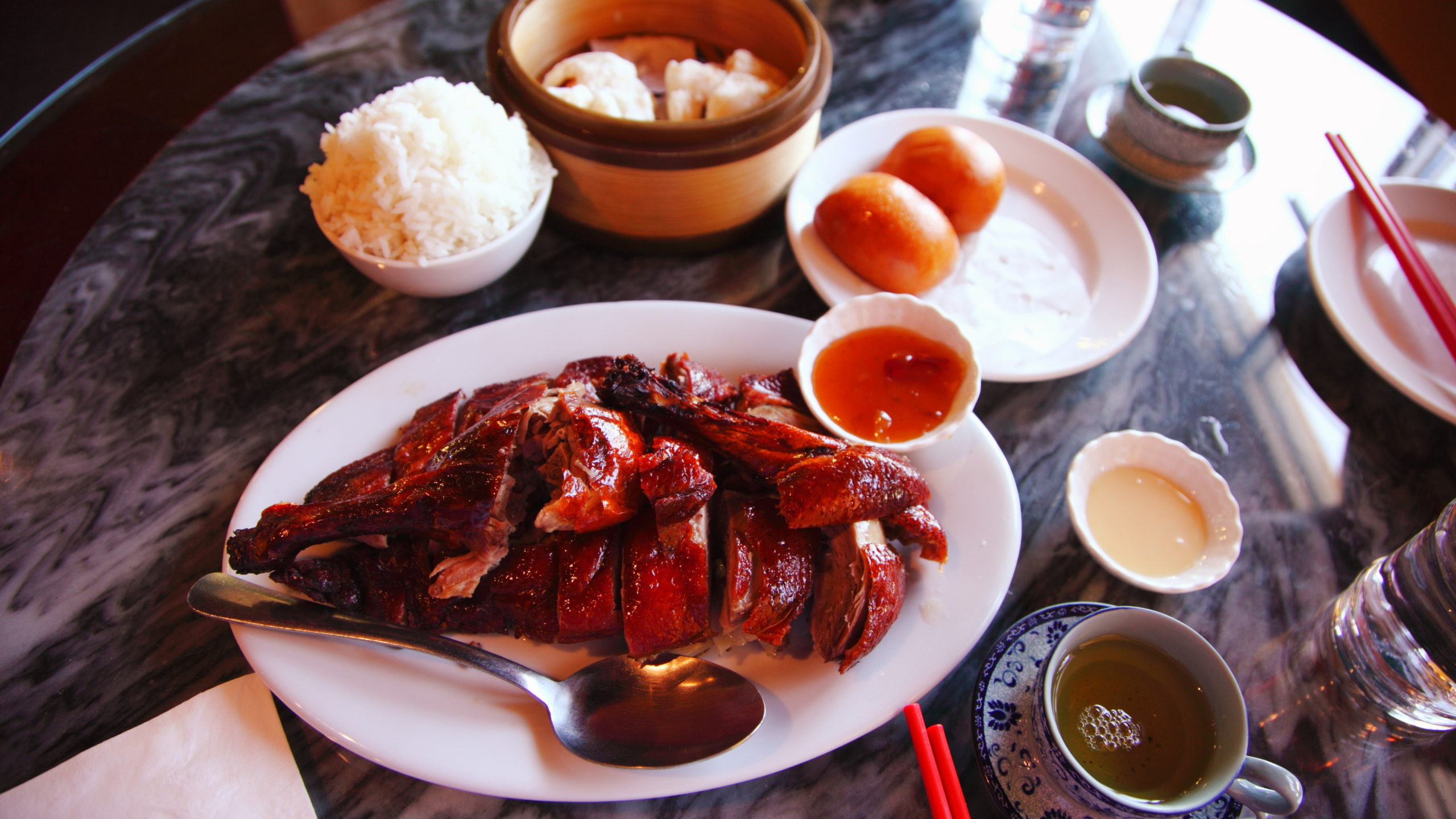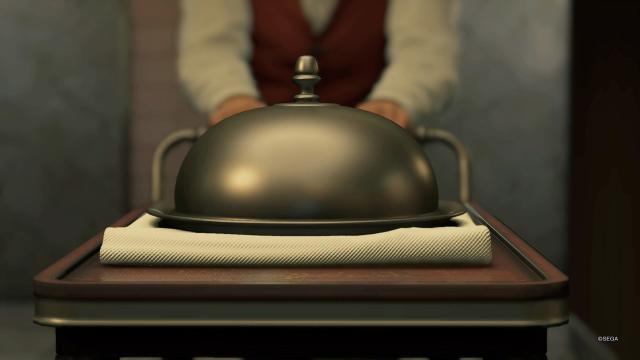Yakuza: Like A Dragon is many things: a satire, a melodrama, a business/real estate simulator, and a dungeon-based RPG. It is also a 60-hour public service announcement for Peking duck.
Growing up in New York as a second-generation Cantonese-American, I rarely ate Peking duck. Instead, I ate Cantonese roasted duck, which is filled with a hoisin-sauce marinade prior to roasting that flavours the meat from the inside. Those ducks you see hanging in the windows of Chinatown’s restaurants are Cantonese roasted duck. You can order the duck as a half or a whole, and the butcher will chop it up for you.
Peking duck is prepared differently. Prior to glazing the duck with honey and spices and roasting it, the chef will blow air underneath the duck’s skin to separate it from the meat, which makes the skin extra crispy. Peking duck is typically carved and served table side, and it is wrapped in steamed pancakes, with scallion and hoisin sauce as garnish.
Peking duck is a royal court dish that dates back to the Yuan Dynasty over 700 years ago. A 600-year-old restaurant called Bianyifang made its reputation serving and popularising Peking duck and continues to do so to this day.

The characters in Yakuza: Like A Dragon discuss Peking duck in laudatory terms, gushing about how they cannot wait to eat the “king of Chinese food.” Food is a recurring motif across gangster cinema: The Godfather, for example, opens with a massive outdoor wedding reception while Vito Corleone grants illicit favours and requests from his shadowy office overlooking the festivities. Goodfellas includes a prison scene where the incarcerated gangsters cook themselves a big dinner, thanks in part to food that Henry Hill’s wife Karen sneaks past security.
In both of these scenes, food highlights a conflict of responsibilities for one’s blood family versus one’s crime family. In these worlds, a “real” man should provide for both, but that is an impossible expectation. Food functions as a visual motif of bad things to come, when the balance between private and public becomes untenable.
In The Godfather trilogy, oranges are a bad omen, foreshadowing danger and violence. In the first movie, Vito is nearly shot to death while shopping for the fruit; he later dies with an orange rind in his mouth. According to director Francis Ford Coppola, the motif was originally unintentional, but he made sure to include it in the following two movies, most memorably at the end of The Godfather: Part III, when Michael Corleone dies alone with an orange in his hand.
In Yakuza: Like A Dragon, any discussion of Peking duck marks a key moment in the game’s father/son relationships, both positive and negative. The game opens with a flashback to yakuza boss Masumi Arakawa’s childhood, when his father takes him out to a lavish feast at a Chinese restaurant where Peking duck is the main course.

The meal, however, is a pretense for an assassination. A hitman, disguised as a waiter, arrives tableside to set up the duck. But the steamer typically used to hold the duck wraps conceals a gun, and the hitman kills Arakawa’s father while the son is in the bathroom.
#PS5Share, #YakuzaLikeADragon pic.twitter.com/DNFpttrtlk
— Kevin Wong (@KevinJamesWong) January 24, 2021
The second time the game references Peking duck, Arakawa is an adult yakuza boss, and he offers to take Ichiban Kasuga, the game’s protagonist, to eat Peking duck on New Year’s Eve. He builds up suspense for the dish by discussing it descriptively, with a self-serious tone that borders on lurid, telling him, “You’ll love it.”
#PS5Share, #YakuzaLikeADragon pic.twitter.com/PxudIkBDEX
— Kevin Wong (@KevinJamesWong) January 24, 2021
The moment is a rare instance where the feared mob boss known to most as “Arakawa the Assassin” shows a rare generosity and human side of himself to a subordinate. But the player also reads deeper into this gesture than Kasuga does, because we know that Peking duck was the last thing Arakawa never got to share with his father. We now know that Arakawa views Kasuga as a surrogate son of sorts.
Unfortunately, the restaurant is closed. Kasuga, sensing the missed opportunity, throws a hilarious tantrum about wanting Peking duck.
#PS5Share, #YakuzaLikeADragon pic.twitter.com/hosXXfm5ry
— Kevin Wong (@KevinJamesWong) January 24, 2021
Kasuga revisits the same restaurant later in the game. He learns more about Arakawa from Chairman Hoshino, who invites Kasuga to eat with him at the same restaurant where Arakawa’s father was killed. There, Hoshino reveals that he was the assassin who killed Awrakawa’s father; Arakawa had confronted him over the murder, years later, and spared his life. During the game’s middle chapters, Hoshino takes on a mentor role for Kasuga and openly admires Kasuga’s loyalty to Arakawa. Kasuga and Hoshino eat Peking duck together, although the scene fades out before we see any actual food.
#PS5Share, #YakuzaLikeADragon pic.twitter.com/IsZwv7TvkO
— Kevin Wong (@KevinJamesWong) January 24, 2021
Arakawa dies in one of the game’s final chapters. His last meal, right after disbanding his yakuza family, is Peking duck, which he eats in the same restaurant with Hoshino. It turns out that Arakawa had never eaten the dish before, and he greatly enjoys it for the first time. But again, the player is deprived of actually seeing him eat it. We only hear about Arakawa’s enjoyment in retrospect.
#PS5Share, #YakuzaLikeADragon pic.twitter.com/NNeydEaL40
— Kevin Wong (@KevinJamesWong) January 24, 2021
Because Arakawa only eats Peking duck after ending his crime family and returning to civilian life, it gives the duck a thematic significance. It was nearly served on the night his family was destroyed, and it’s actually served on the night he reclaims something like the more innocent life he lived before his father was murdered. That he eats Peking duck with Chairman Hoshino, the man who killed his father, brings Arakawa’s trauma and healing full circle.
Lastly, we learn Arakawa and Kasuga were actually biological father and son due to a switch at birth, though Arakawa dies without learning the truth. In retrospect, Arakawa and Kasuga’s missed meal together underlines this missed connection and the happy family that wasn’t. That we never actually see Peking duck, either served or eaten, underlines the tragedy, and suggests that Arakawa’s two families — his crime family and blood family — were never reconcilable.
In short, Peking duck is delicious. And in Yakuza: Like A Dragon, as in real life, good Peking duck is worth the trouble of finding it.

Leave a Reply